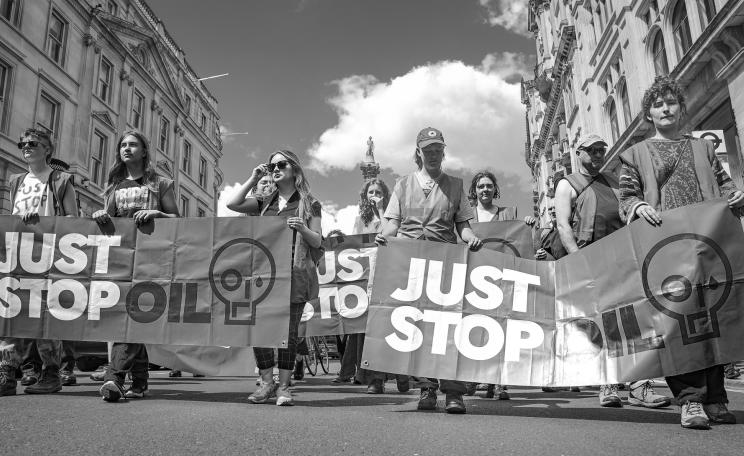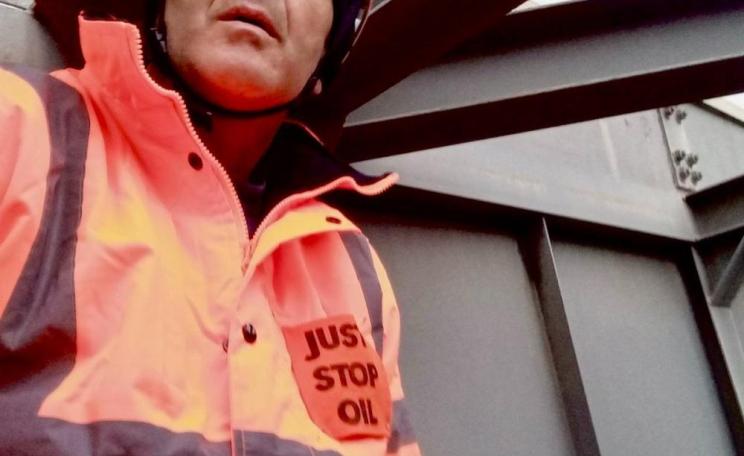We will create a genuine counter-ideology—one that takes joy in struggle, celebrates the community of resistance.
I'm on a wing with a load of 'lifers' - people serving life sentences. "So, how long are you in for?" one approached me and asked a while ago. "Five years," I said. "Ah, that's not long," he replied.
I have done hundreds of public talks about our situation, and I used to remind people that we don't live in Egypt. No one is going to get their fingernails pulled out.
A colleague while I was at researching at King's College in London studied trade union activity in Egypt before Tahrir Square. He would sit in a room in Cairo with a circle of guys, most of whom had scars on their faces. They had all been tortured. Shortly afterwards, the revolution happened.
FURTHER READING: THE SCIENCE OF NONVIOLENT DIRECT ACTION
Moral
The problem is not "state oppression" but those on "our side" who do the work of the "oppressor" by endlessly giving reasons why resistance "will not work."
When I did strategy work for Extinction Rebellion in 2019, the biggest headache wasn't police oppression: it was having semi-informed "left" journalists and other hangers-on who opined that the civil resistance model we used was no good because it was rooted in Erica Chenoweth's research in authoritarian regimes. As if people in such contexts live on a different planet!
In their cynicism, they have now adopted the opposite argument: the model doesn't work precisely because we now live in a more authoritarian regime.
This is what I call the Aaron Bastani syndrome. Whatever happens, you refuse to leave the privilege of your journalistic gaze. When I challenged him to lead a march, he responded, "I don't think that would be wise."
This aversion to taking any real moral responsibility for the state of the world by those who claim to speak for us is far worse than any "state oppression".
Ideology
Given that I did nearly a decade of research at KCL on the relationship between levels of oppression and resistance, let me give you my one-line response to the question, "Does state oppression hinder social movements?": there is no relation.
Successful movement building and popular political power are functions of internal culture - ideology, organisation, and leadership. Of course, there is a case that external repression has an impact, but if there is a signal, it is very much lost in the noise of other factors.
So why do our "left" and "liberal" commentators get it so wrong? Another one-line answer would be that they are materialists.
They look at the world in the same way as a capitalist: more repression (cost) in, less activism (money left) out. As such, they are the most effective agents for the neoliberal regime—the obscene ideology that humanity is just stuff. Dead stuff. You shouldn't lead a march because you will lose things—clicks, reputation, liberties.
We will create a genuine counter-ideology—one that takes joy in struggle, celebrates the community of resistance.
Agency
The very supposed radicalism of their analysis betrays appalling reactionary politics. They are so clever: they can give you all the reasons things are so bad, all the reasons why the powerful have so much power, and why people are so oppressed—so much so that there is zero chance they can revolt.
The "is" becomes an "ought." Self-fulfilling prophecy dynamics do their work very nicely. Job done. With friends like these…
On the frontline, everyone's a lot more cheerful. Because human beings, of course, are not pieces of dead stuff.
They are, in fact, explosions of spirit, driven by desire, searchers for meaning, recognition, and adventure. Or, at least, when they're not being told they are too oppressed to do anything. To use the more subdued language of academia - they always have agency.
Tipping
Most of us who have recently received years-long sentences say, "Well, obviously, what do you expect?" If a regime is in the process of setting in play the mass slaughter, starvation, and rape of millions of the poorest people in this world, do you think they are going to think twice about locking up the people who try to stop them?
Buried in The Guardian last week was an article about conditions in the camps in Tunisia, where hundreds of thousands of people are trapped. Reading between the lines, it is clear that the EU's policy is to ignore a systematic assault and killing of refugees.
And this is just at 1.5°C. There will be 1,000 million people on the move at 2°C. But our commentators say doing something real about that "would still not be wise."
The main point is this: if we want to indulge in structural determinism, I suggest we remind ourselves that all historical regimes go in a cycle—birth, peak, hubris, collapse. Collapse is now locked in. The government, in the broadest sense of the word, will collapse. Too many tipping points have been crossed.
Revolutions
At some point in the next few years, the "climate" will have a moment of whirlwind—its "George Floyd" moment, its "Gaza" moment. Except this time, many more millions of people will be on the streets of Western cities because thousands of people—white people, that is—will be killed.
The repression, overnight, will turn to rage. And no one is going to give a ruck about risking arrest. The spirit of Nietzsche will take over from the spirit of Bentham. Life is for living, not for being wise. The bourgeoisie colonisation of our minds will be conquered. History will be back on the move.
In the meantime, it's a matter of focusing on the job—what we can change.
We must create systematic mobilisation, mass-train people in organisation and leadership. Most of all, we will create a genuine counter-ideology—one that takes joy in struggle, celebrates the community of resistance, and lays down the plans for what comes next after the inevitable revolutions to come.
There's no need to worry about your bedroom door being locked for a while.
This Author
Roger Hallam is a founding member of Extinction Rebellion and Just Stop Oil. He is currently serving a five year prison sentence for participating in a online call discussing a climate action on the M25.






